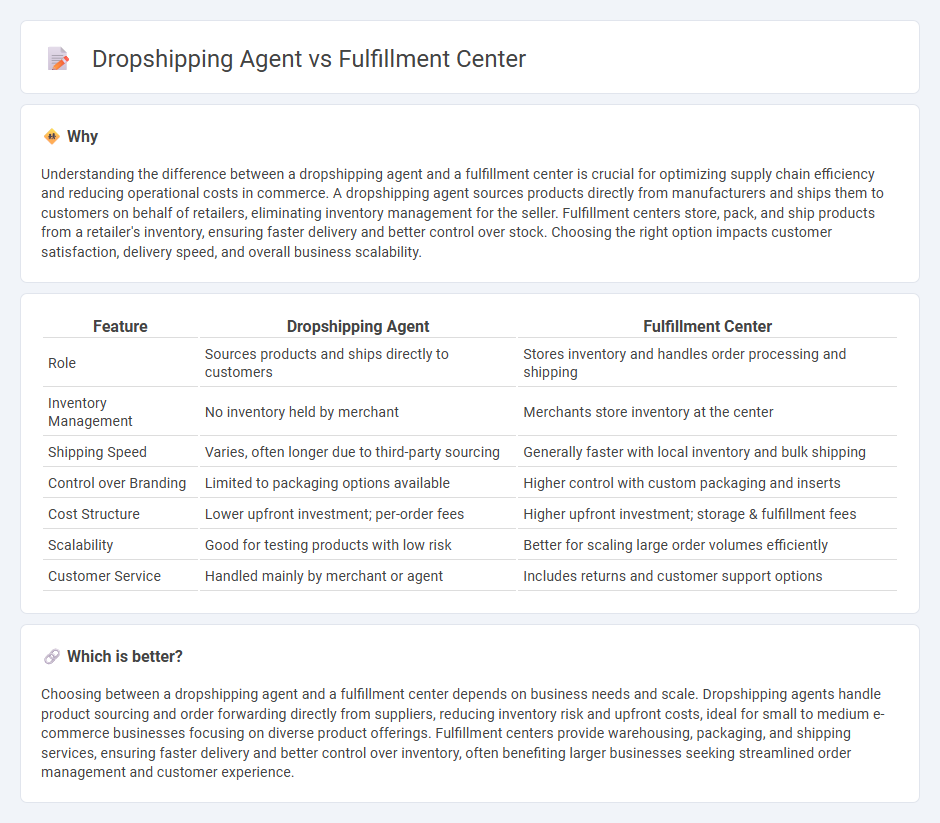
Dropshipping agents act as intermediaries who source products directly from suppliers and ship them to customers on behalf of retailers, minimizing inventory management and upfront costs. Fulfillment centers handle warehousing, packaging, and shipping of products for e-commerce businesses, ensuring faster delivery and streamlined inventory control. Explore the key differences and advantages of dropshipping agents versus fulfillment centers to optimize your commerce strategy.
Why it is important
Understanding the difference between a dropshipping agent and a fulfillment center is crucial for optimizing supply chain efficiency and reducing operational costs in commerce. A dropshipping agent sources products directly from manufacturers and ships them to customers on behalf of retailers, eliminating inventory management for the seller. Fulfillment centers store, pack, and ship products from a retailer's inventory, ensuring faster delivery and better control over stock. Choosing the right option impacts customer satisfaction, delivery speed, and overall business scalability.
Comparison Table
| Feature | Dropshipping Agent | Fulfillment Center |
|---|---|---|
| Role | Sources products and ships directly to customers | Stores inventory and handles order processing and shipping |
| Inventory Management | No inventory held by merchant | Merchants store inventory at the center |
| Shipping Speed | Varies, often longer due to third-party sourcing | Generally faster with local inventory and bulk shipping |
| Control over Branding | Limited to packaging options available | Higher control with custom packaging and inserts |
| Cost Structure | Lower upfront investment; per-order fees | Higher upfront investment; storage & fulfillment fees |
| Scalability | Good for testing products with low risk | Better for scaling large order volumes efficiently |
| Customer Service | Handled mainly by merchant or agent | Includes returns and customer support options |
Which is better?
Choosing between a dropshipping agent and a fulfillment center depends on business needs and scale. Dropshipping agents handle product sourcing and order forwarding directly from suppliers, reducing inventory risk and upfront costs, ideal for small to medium e-commerce businesses focusing on diverse product offerings. Fulfillment centers provide warehousing, packaging, and shipping services, ensuring faster delivery and better control over inventory, often benefiting larger businesses seeking streamlined order management and customer experience.
Connection
A dropshipping agent acts as an intermediary between the retailer and the supplier, managing product sourcing, quality control, and order processing to streamline operations. Fulfillment centers handle inventory storage, packaging, and shipping, ensuring timely delivery to customers and reducing logistical burdens for dropshipping retailers. The collaboration between dropshipping agents and fulfillment centers optimizes supply chain efficiency, improves order accuracy, and enhances customer satisfaction in e-commerce.
Key Terms
Inventory Management
Fulfillment centers maintain and manage inventory in their warehouses, ensuring real-time stock tracking, order processing, and efficient shipping logistics. Dropshipping agents do not hold inventory but act as intermediaries, coordinating order fulfillment directly from suppliers to customers without inventory control. Explore the advantages and operational differences between these models to optimize your supply chain strategy.
Order Processing
Fulfillment centers manage inventory, pick, pack, and ship products directly to customers, ensuring faster order processing and greater control over stock levels. Dropshipping agents relay customer orders to suppliers who ship items directly, often resulting in longer fulfillment times and variable quality control. Explore detailed comparisons to optimize your supply chain strategy.
Shipping Responsibility
A fulfillment center manages inventory storage, packaging, and shipping, taking full responsibility for timely order delivery and handling returns. In contrast, a dropshipping agent coordinates with suppliers to ship products directly to customers, shifting shipping responsibility away from the retailer. Explore the key differences between fulfillment centers and dropshipping agents to optimize your shipping strategy.
Source and External Links
Fulfillment Center & Warehousing Services: Tips and Tactics - A fulfillment center is a large, specialized facility operated by sellers or third-party logistics (3PL) providers to manage inventory, pick, pack, and ship customer orders efficiently, often handling both business-to-consumer (B2C) and business-to-business (B2B) fulfillment with the goal of improving customer satisfaction and reducing costs.
Fulfillment Centers: The Powerhouse for Seamless eCommerce - Fulfillment centers act as central hubs that store inventory, process orders, conduct quality control, and coordinate shipping and returns, often using advanced technology and automation to enable eCommerce companies to outsource fulfillment and focus on core business activities.
What Is a Fulfillment Center? Everything You Need to Know - A fulfillment center is a third-party service provider that manages sellers' inventory and fulfills customer orders rapidly through technology like warehouse management systems and barcode scanning, optimizing accuracy and efficiency in the pick, pack, and ship processes.
 dowidth.com
dowidth.com